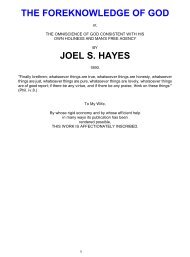Are Men Born Sinners? - Library of Theology
Are Men Born Sinners? - Library of Theology
Are Men Born Sinners? - Library of Theology
You also want an ePaper? Increase the reach of your titles
YUMPU automatically turns print PDFs into web optimized ePapers that Google loves.
this was through a degradation <strong>of</strong> their nature physically propagated down from father to<br />
son; or whether it was (as Chrysostom, cumenius, Pelagius, Erasmus, and others have<br />
with little probability maintained), only by virtue <strong>of</strong> the example which he set, or whether<br />
it was in some other way, is not determined by the language <strong>of</strong> the text. Such expressions<br />
as we have seen above, do not determine <strong>of</strong> themselves either the degree or the kind <strong>of</strong><br />
causality. Principal or subordinate causation in this case may either <strong>of</strong> them be expressed<br />
by the phrase dia tes--katestathesan. The strenuous advocate for imputation avers,<br />
however, that the posterity <strong>of</strong> Adam were constituted sinners, by his <strong>of</strong>fence being<br />
imputed to them, and their being treated as though they had committed it.<br />
But when I look at the nature <strong>of</strong> this case, and ask what language the apostle would most<br />
probably have employed, had he designed to convey such a meaning, I am constrained to<br />
say, that the case can hardly be supposed with probability, that he would have employed<br />
merely such language as that before us, when other modes <strong>of</strong> expression more explicit<br />
and obvious were within his reach. hoti en auto hamartoloi elogisthesan--hoti autois<br />
elogisthe he hamartia autou--or else hoti esan hupodikoi dia tes hamartias aotou, or<br />
something equivalent to these expressions, might, not to say must, have been added after<br />
hoi polloi, so as to prevent all mistake. But as the matter now is, with the necessarily<br />
active sense <strong>of</strong> hamartoloi, the language itself cannot lead us philologically to the<br />
supposition <strong>of</strong> an imputation scheme <strong>of</strong> sin. See comm. on this verse and the preceding<br />
Excursus.<br />
That men should be constituted or made sinners by the disobedience <strong>of</strong> Adam, most<br />
naturally means, I had almost said, must necessarily mean, that in some way his <strong>of</strong>fence<br />
so affected them as that they become actual sinners in propria persona. Now is anything<br />
more common than this mode <strong>of</strong> expression? 'A man <strong>of</strong> vicious character,' we say,<br />
'corrupts his whole family. A pr<strong>of</strong>ligate <strong>of</strong> winning exterior corrupts the whole<br />
neighborhood <strong>of</strong> youth around him. One sceptic makes many doubters in revelation.<br />
Voltaire made half <strong>of</strong> literary Europe sceptical.' Now in these and a thousand other like<br />
expressions, we do mean to assert an active influence, a real causality in some proper<br />
sense, <strong>of</strong> the evil done or spoken. Yet we never once think, for example, <strong>of</strong> Voltaire's<br />
scepticism being imputed to half <strong>of</strong> literacy Europe; nor do we once imagine, that any <strong>of</strong><br />
the classes above named as being corrupted are corrupted without any voluntary agency<br />
<strong>of</strong> their own. The sin <strong>of</strong> corrupt feelings and affections is entirely their own: it matters not<br />
what the causes were which operated on them, so long as they were after all left to their<br />
own choice whether they would yield to the excitement or resist it.<br />
In what way, then, does Adam's sin operate, in order to produce the effect which the<br />
apostle attributes to it? The degree, the extent, and nature <strong>of</strong> this influence, seem all to be<br />
laid open in the text. It amounts to such a degree as to involve us in a ruinous state or<br />
condition; it extends to all the posterity <strong>of</strong> Adam; it is a cause or ground <strong>of</strong> moral<br />
depravation, for it is the cause or occasion <strong>of</strong> all men's coming into condemnation, and<br />
therefore it must be a cause <strong>of</strong> their becoming sinners. But after all, the modus operandi is<br />
not declared by the apostle. He does not say, whether the operation <strong>of</strong> Adam's sin is on<br />
our physical or mental constitution; or whether it has influence merely on the condition in<br />
which we are placed, as being expelled from paradise and surrounded by peculiar






